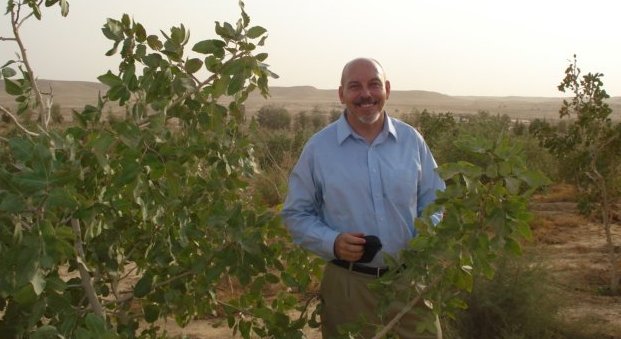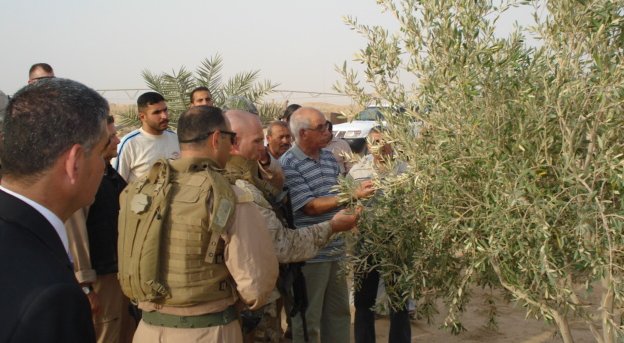It is not a surprise that Iraqis have plans to hold back their advancing desert and control the clouds of dust and I am glad that they “stole” my idea before I even had it. We had an exciting time talking to like minded Iraqis. All the differences of culture and history melted away when we talked about how to get trees to grow in the desert, hold back the sands and conserve water resources. I guess I am a little nerdy that way, but so were my Iraqi friends.
Below – Outstanding in their field. This is the experimental tree farm near Anah. I am standing in front of a seven year old pistachio tree. There are also olives, dates, poplars, cedars and pines. So far, the olives, dates and pistachios are most successful.

Plans to set up a string of oases were put on hold by the many conflicts Iraq suffered and provoked over the last generation. The old man I talked to got his agricultural education in Belgium a long time ago. He lamented the lost time and the encroaching desert, but what he felt most acutely was the isolation. Iraqi scientists lost contact with the rest of the world, during the Saddam tyranny and sanctions. They were unable to properly contribute to and benefit from the advance of knowledge in preserving arid lands, so their level of expertise is more than twenty years old. A lot has happened since then.

For example, the Iraqi scientist explained that the Chinese had done a lot of practical research in controlling moving sand dunes. Sand dunes can swallow fields and whole villages. Dunes are almost impossible to hold back by physical means alone. You can build all the walls you want and they just crawl over. Just shaping a dune with bulldozers is a waste of time; planting vegetation on moving sand is ineffective. A combination of physical and biological means, however, can make hold them in place, or at least slow their movement.
We talked about the dust. As I mentioned in an earlier post, I suspected that the dust we experience in Anbar is not part of the natural environment and that properly managed and conserved land would not produce these sorts of dust storms. The Iraqi scientist confirmed this. They had figures that showed the effects of land management on the dust. (The texts were in Arabic, but they assured me that is what they said.) And they had a simple plan to counteract the worst of the problem.
Below – the guy with the blue stripped shirt is the honcho of the project.

The Iraqis want to do what we did. During the great depression and the dust bowl, plans were made to plant a series of windbreaks from Canada to Mexico. They never succeeded in finishing the whole plan, but the windbreaks did help moderate the erosion problem. They experimented with trees that would grow on the bleak, windswept plains. One of the relics of this is the Denbigh Experimental Forest in North Dakota, which was established in 1931 and is still growing today in a place where trees had not grown before since the end of the last ice age. It is only around one square mile, but after 77 years, you might call it a success.
The Iraqis I talked to would like to plant a series of oases all across the desert around 20km apart. They told me that they estimated that it would cost around $300,000 each to establish plantations the size of the one I saw near Anah. They require irrigation and care until established, but once established they are more or less self sufficient. As their experience grows and they see which trees do best in the environment, presumably the survivability will improve.
Lots of countries have challenges of dry lands. Many see shortages of clean water as the biggest predicament of the next century. Now that the dark days of the Saddam times are finished, Iraqis can take advantage of what others have learned. And when they share their knowledge with the rest of the world, we all we be better for it.
Our job, more specifically Dennis Neffendorf’s job, will be to find contacts and put our Iraqi friends back in touch to the extent we can help. My guess is that tree nerds and conservationists around the world will be excited and want to renew these contacts.
It will be an easy sell.
